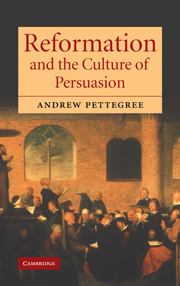2 - Preaching
Published online by Cambridge University Press: 04 December 2009
Summary
Luther and his colleagues would make much play with the concept of the new evangelical sermon. We should certainly not underestimate the element of novelty, and the surprise of the new. The priest who commandeered the pulpit – often his own pulpit – to launch a bold attack on time-honoured practices and the doctrine of the community he served was bound to cause a sensation. The impact on his congregation, moved, excited, troubled or appalled, was clearly profound. But it was so precisely because the sermon was so fundamental a part of church life. It also played an important role in the wider information culture of pre-modern society. In a world where most information continued to be conveyed by word of mouth, few could doubt that preaching represented one of the primary means of communication with a wider public.
This was a world the reformers instinctively understood. Few doubted that, if they were to reach their audience, it would be through the medium of the word: and that meant in the first instance the word preached, as much as their published works. Many of those who would make up the first generation of the leaders of the Reformation had made their reputation first as preachers; they owed both their local reputation and the opportunity to contribute to the new evangelical movement to their skill in the pulpit. All, without exception, regarded preaching as fundamental to their duty as pastors, and to their evangelical mission.
- Type
- Chapter
- Information
- Reformation and the Culture of Persuasion , pp. 10 - 39Publisher: Cambridge University PressPrint publication year: 2005
- 1
- Cited by

